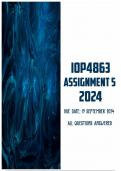, PLEASE USE THIS DOCUMENT AS A GUIDE TO ANSWER YOUR ASSIGNMENT
Please note that the author of this document will not responsibility for any plagiarizing you
commit.
PART A: PERSONNEL PSYCHOLOGY
1. Generally, South African labour laws prohibit unfair discrimination. The Labour Relations
Act 66 of 1995 (as amended) and the Employment Equity Act 55 of 1998 (as amended) are
explicit on issues of unfair discrimination. Despite this regulatory framework, debates around
the issues of fairness remain intense. Fairness in personnel psychology must be demonstrated,
using scientific methods. Discuss fairness in employment decisions by focusing on the following:
1.1. The difference between unfair discrimination and adverse impact.
Unfair Discrimination: In an employment context, unfair discrimination refers to situations where
individuals or groups are treated unfavorably based on characteristics unrelated to their job
performance (e.g., race, gender, or age). This can be intentional or unintentional. Unfair
discrimination results in the denial or restriction of employment opportunities for certain groups,
regardless of their actual qualifications or abilities. For instance, intentionally excluding individuals
with disabilities from a job, even if they are capable of performing it, constitutes unfair
discrimination.
Adverse Impact: Adverse impact occurs when a seemingly neutral employment policy or procedure
disproportionately affects a particular group, even though it is applied uniformly. Unlike unfair
discrimination, adverse impact is often unintentional and arises when standards lead to different
employment outcomes for various groups. For example, setting a minimum height requirement for
police cadets may inadvertently disadvantage women, Asians, and Hispanics. To justify such a
policy, an employer would need to prove its job relevance and necessity.




